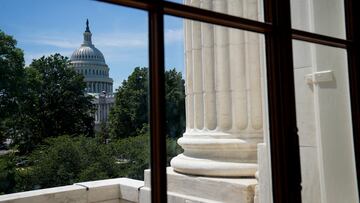What is the debt ceiling and why does it matter?
The borrowing limit is set by Congress and politicians are at loggerheads in negotiations to increase its size with potentially catastrophic effects.

What does the debt ceiling mean to the average American? Well, very little, if we are being honest.
The debt ceiling, or debt limit, places a maximum on the “total amount of money that the United States government is authorized to borrow to meet its existing legal obligations.” These obligations include Social Security and Medicare benefits, military salaries, tax refunds, and many other government-funded programs. By increasing the debt limit, Congress is effectively increasing the amount of money that the Treasury can borrow to pay its bills.
The current debt ceiling will be reached by June and if an increase or suspension is not enacted, the US Treasury risks defaulting on its loans. Such a situation could force the government to stop payments for Medicaid, Medicare, SNAP, Social Security, and many other programs on which people across the country depend. If such a situation were to materialize, the impact on citizens would be felt in very profound ways. However, if an agreement is reached, very few people will not notice any difference in their day-to-day.
Why does the GOP want to cut spending?
To whatever extent a platform was put forth by the GOP during the mid-terms, reigning in government spending was an important and unpopular plank. The decision to campaign on cuts to social spending or plans to privatize Social Security may have contributed to their historic electoral defeat, leaving them with a four-seat majority in the House of Representatives and Democrats holding onto control in the Senate.
The notion that the government needs to cut spending is a bizarre semi-paternalistic desire held by many Republicans. The commitment was articulated by Representative French Hill back in January as he held up a blank piece of paper, saying that the empty sheet represented the calls from constituents to cut government spending (i.e., meaning no one had called his office and encouraged him to cut spending).
“No one has asked me to cut spending in writing, and there aren’t many people who get a lot of mail to cut spending and to set spending priorities. In contrast, we get hundreds of letters to increase spending,” said Hill. The US is a representative democracy meaning that legislators are elected to represent the needs and opinions of their constitutnets. For Rep. Hill, it seems that this responsibility only kicks into action when he agrees with those who sent him to Washington.
Rep. Hill represents Arkansas’ Second Congressional District which includes the city of Little Rock.
Little Rock has one of the highest rates of food insecurity, particularly for children of any city in the US. Not to mention, 15 percent of the city’s 200,000 residents live in poverty, and over 1,000 face homelessness. At the state level, nearly one in ten residents lack access to healthcare, and the state’s schools are ranked 42nd in the country.
Ensuring future generations are offered a life where they are not burdened by financial mismanagement should be a goal shared by all government representatives. But those same people who will one day fill important roles in society as teachers, sanitation workers, firefighters, and nurses aren’t done any favors by Congress slashing of social spending in their name. Such an effort would only weaken the promise of equality of opportunity that the legislative body claims to offer its citizens.
Cuts to social spending could be coming
Typically, the debt limit is increased without strings attached. For some members of the GOP, this way of doing business is unacceptable, and thus refuse to vote for an increase unless commitments to cut government spending are made.
Speaker of the House Kevin McCarthy has framed the conversation over increasing the debt ceiling as a way to stop, what he sees, as Democrats spending public money like a child who maxes out their parents credit card.
Democrats, however, see this play as a way to make cuts to social programs like Social Security and Medicare. Although the Department of Defense’s budget has grown 20 percent since 2016, both parties agree that no cuts should be made to military spending, meaning that any cuts are likely to come from domestic programs.
McCarthy has urged the White House to sit down with House Republicans to “find a place where we can protect Medicare and Social Security for the future generations.”
“Let’s put our house in order in how we are going to spend — and let’s make the investments we need to make America stronger,” argued the Speaker.
With less than a month to strike a deal, McCarthy has two options thanks to his four-seat majority. The first is to pass a clean debt ceiling increase with support for Democrats. The second, which seems increasingly likely would be to pass an increase with conditions on spending attached that he hopes are tolerable to Senate Democrats and the White House.
Unless an agreement is reached, the debt limit will be surpassed by June. If no efforts are made to raise it, the US risks defaulting on its debt repayments, which could trigger a global economic crisis. As the deadline approaches, the GOP must finalize its proposal to curtail spending, and if the White House and Senate reject it, McCarthy will have to navigate getting the votes from a caucus that may not be willing to offer them.
Congress has never failed to increase the debt ceiling when necessary.






